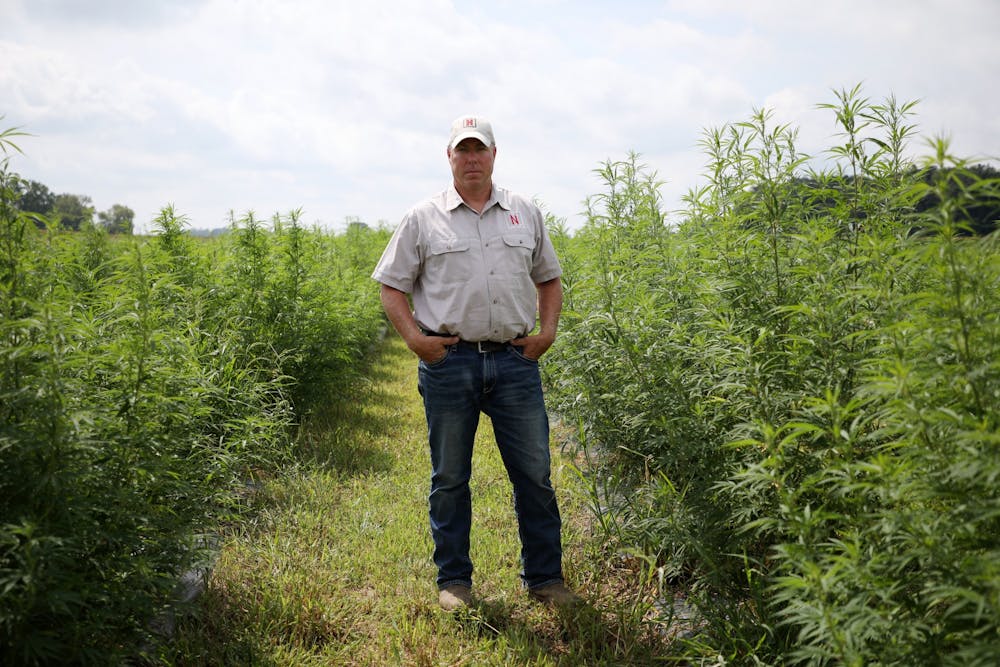On a typical day, Brian Nixon gets to the farm, gets prepared and gets out to the field to start planting or harvesting. With corn, soybeans and hemp across 3,300 acres of land, the workload is always there. Whether he’s cutting freshly-dried beans in blowing winds from lunchtime into the night or shelling corn “until as late as elevators are open,” he said the days can be long and only Mother Nature can tell him when to stop.
“When you’re planting and the weather is fair, one day sort of bleeds into two and sometimes two into three when it’s really fair conditions…we’re known to put in a couple 24 to 48-hour stretches in the spring,” Nixon said.
This is just the beginning of Nixon’s responsibilities as founder of Brian Nixon Family Farms, LLC. He also manages risks, such as weather and fast-approaching deadlines, to ensure the yield potential, or the highest amount of crop that can be harvested per acre under ideal circumstances, is not lowered. Being that he farms for not only himself but also others across Indiana’s Delaware, Madison and Henry counties, attention to detail is extremely important. He has to get the little things right from the moment spring starts to avoid the repercussions of not doing so in the fall.
This is not how Nixon’s life has always been, but it is how his life began.
Nixon’s relationship with farming started when he was growing up on his grandfather’s farm. He worked alongside his father and brothers from age five until his high school graduation.
“I was always working there, riding with my father and being in the tractors,” Nixon said. “That environment and that experience gets in your blood.”
After graduating high school, he attended college, where he studied to become a physical therapist. Upon making this decision, farming fell to the background for the first time in his life.
While Nixon said he dearly loved his job, he could tell he was always yearning for something more entrepreneurial. Despite this, he still had no idea that farming would later become his life’s work.
That was until 2009 when Nixon got the chance to purchase some ground just around the corner from where his grandfather’s farm was located, something he described as a “blessing and a once-in-a-lifetime opportunity.”
“I did it kind of full time both ways,” he said. “I had a full-time physical therapy job … and was farming large enough to be a full-time job, as well.”
Even with the help of his father and a part-time worker, the workload eventually grew too large, forcing Nixon to quit his job as a full-time physical therapist at the end of spring 2012.
When Nixon met Kyle Crabtree, who he would later refer to as his “first-in-command” for working with him the longest, Crabtree was a custom applicator— a person in charge of the spray equipment operation for the application of pesticides and fertilizers. In 2018, Nixon invited Crabtree to join the farm as a permanent, everyday worker, and Crabtree accepted the offer and quit his job.
“It was a good move for me,” Crabtree said. “We all pretty much share most duties, and working with [Nixon] has been just phenomenal.”
Crabtree was not the only permanent addition made to the farm during that time. Following the passage of the federal 2018 Farm Bill, which legalized hemp cultivation and the transportation of hemp-derived products (including lotions and oils) across state lines for commercial use, Nixon made the decision to start growing hemp as a way to diversify the farm. He said he heard lots of discussion involving the plant during some of the forums and breakout sessions of conferences he attended.
Nixon said the decision to start growing hemp was experimental at first due to the risks of the industry.
“There’s 101 pitfalls on the way to go broke and get lost in this portion of the business,” he said.
However, after around a year and a half of preparation and assurance of good people around him in the process, Nixon said they “hit a home run.”

According to Marguerite Bolt, a hemp specialist at Purdue Extension, the hemp industry is growing, but there is still a lot of room for development.
“There are people who are trying to build this industry; it just needs more awareness and more folks that want to actually process and manufacture,” she said. “That’s sort of one of the missing elements— the supply chain.”
Bolt said she sees grains and fibers largely expanding if the supply chain improves, and she also predicts a permanent place and a growing market for hemp-derived CBD products.
While the legislation allowed for hemp cultivation, the process is still very regulated, according to her. She said a license is required to grow hemp in all states and that the Office of the Indiana State Chemist runs Indiana’s licensing program, tests hemp and sends necessary reporting to the United States Department of Agriculture. A federal background check is also required prior to being licensed.
Bolt said much of the hesitancy surrounding cannabis as a plant stems from an inability of many to differentiate between hemp and marijuana.
Despite both being cannabis, hemp and marijuana are not the same for many reasons, first of which being the levels of THC in them. THC is the main psychoactive compound found in marijuana plants, meaning it produces a “high” effect, whereas hemp must contain less than 0.3 percent of this compound, per federal law.
“People get really caught up … without recognizing that the plant in general is so much more than just the compounds that it produces, and those are important and valuable,” Bolt said. “It can be used for thousands of different products and applications across so many industries, like human food products and cosmetics, building materials, automotive industry applications, the textile industry … it just has so many facets that it can fit into.”
Since making the decision to grow hemp, Nixon has begun to use it to produce CBD oil and other products for his business Wellness Tree, LLC, which he launched alongside one of his high school classmates, Billy Tabor, in 2020. They offer sleep gummies, pet treats, oils and creams with CBD.
“Our product line is always advancing and the production of each product was kind of slow at first, but we've got seven products in a little over a year, and there's more coming online about every six months,” Nixon said.
While both compounds are present in the cannabis plant, CBD is vastly different from THC. It does not produce a ‘high’ effect and has no dependence potential, according to the World Health Organization. Furthermore, animal studies and research in humans suggest CBD may aid those with anxiety, insomnia or chronic pain, according to Peter Grinspoon, an instructor at Harvard Medical School.
Upon growing hemp, Nixon said the response was welcoming “with maybe a raised eyebrow.” This was due to factors, such as the smell during the plant’s growth and vegetative state, he said.
“There’s such a stigma about growing it,” Nixon said. “There’s a huge stigma about utilizing it.”
In order to help the community better understand the plant and its many uses, Nixon and others at Wellness Tree, LLC, have produced educational events at places like doctors’ offices, chiropractors’ offices and rotary clubs in Yorktown and Muncie.
“That was a real honor to be able to speak with people,” Nixon said. “They had very good, educated questions. So people are starting to drop the stigma, but we use [the word ‘stigma’] all the time…”
As far as the future of the farm, Nixon said he hopes to add additional acres for farming hemp, ideally between five and 20. He also is invested in sustainable farming, meaning he avoids the overuse of fertilizers, pesticides and other chemicals, he said. He also monitors the ground through soil sampling on a regular basis.
“What we strive to do is be able to do things with a certain amount of stewardship that we really take pride in,” Nixon said, “so that we can continue to farm into the future and do things with sustainability in mind so that it’s good for the earth and good for my kids and good for the way we're doing things.”
Contact Evan Chandler with comments via email at eachandler@bsu.edu or on Twitter @evanachandler.





